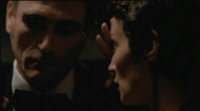Channeling the understated and incisive relational observations of Eric Rohmer, refracted through the magical realist convergences of Raul Ruiz’s voluptuous living memories, and bifurcated through Hong Sang-soo’s situational parallelisms, All the Fine Promises is a gorgeously rendered, lyrical encapsulation of Jean-Paul Civeyrac’s aesthetic modulations between physicality and sensuality, dreams and reality, memory and desire. Ostensibly a muted, and seemingly mundane tale of a sensitive, hopeless romantic cellist named Marianne (Jeanne Balibar) who, already melancholic over her mother’s (Eva Truffaut) recent death and the somber task of having to disposition her parents’ home and personal effects, is further emotionally strained by the uncertainty over the course of her relationship with her callous and flighty occasional lover Etienne (Renaud Bécard), the film is also a thoughtful exposition on the nature – and myth – of romantic love and the process of grief, healing, and reconciliation. Consumed with the idea that her late father (Pierre Léon) had a former mistress, Béatrice (Bulle Ogier) whom he would refer to in his private correspondences as his one true love, and in particular, her father’s unfinished gesture to bequeath a box of personal memorabilia to the unknown woman upon his death from terminal illness (a final wish that her mother, not surprisingly, never carried out during her lifetime) Marianne decides to leave Paris and embark on an impulsive – and inevitably, transformative – trip to the country to fulfill her father’s dying request.
The lyricality of the film’s opening sequence, as Marianne passes an admiring note to Etienne from across the stage floor during an orchestra performance, even as he continues to make flirtatious, eye contact with an attractive (and attentive) flautist (Raphaële Godin), provides an ingenious foreshadowing to the intrinsic musicality of the film’s narrative structure, with the passing of the love note serving as a figurative overture to the nascent development of their relationship. Variations in the recurring motif of unreturned messages left on cell phone voicemails – first, by Marianne, then subsequently, Etienne – further reflect the stanza-chorus structure of the film. This interconnection of musicality and narrative structure – an integral element within Anne Wiazemsky’s novel Hymnes à l’amour from which the film is based, proves to be particularly relevant within the context of the ironic leitmotif of Edith Piaf’s Hymn to Love, a soulful ballad of unabashed romantic melancholy that not only directly represents the memory of her father (Hymn to Love had been his favorite song), but also serves as an oneiric device for Marianne’s haunted dreams that interweave the past and present as refigurations of her own unreconciled existential limbo of unrequited love and perpetual longing. Appropriated by both Marianne’s mother and father as their own private “hymns of love” for their respective, numerous affairs (as well as their own affection for each other) to evoke the sentiment of their newfound (and perhaps, even rekindled) love – a clandestine, knowingly shared public articulation of their (fleeting) connections of romanticized love affairs – the idea of a commemorative love song is reduced to the banality of insincere affection, self-absorption, emotional inertia, and meaningless infidelity. Moreover, the juxtaposition of casually embarked relationships and doomed love (in particular, the accidental death of the mother’s lover, François’ (Renaud Legrand) after a cocktail party at the couple’s home, and the father’s threat of suicide after Béatrice leaves him) underscores the paradox of Marianne’s (and in turn, her parents’) delusive romanticism (note that the premise of François’ car accidentally crashing into the sea serves as a seemingly interconnected false memory on the loss of an idealized love in Civeyrac’s subsequent film À travers la forêt). Culminating in a metaphoric shedding of the skin as Marianne exchanges outerwear with a fellow passenger to avoid detection as she disembarks from the train, her complete metamorphosis can be seen in her emergence into the proverbial light, where the idea of profound love is no longer measured by the idealized weight of suffering or tragic (if hollow) gestures, but in the collective embrace of memories and shared loss.
©Acquarello 2006. All rights reserved.
